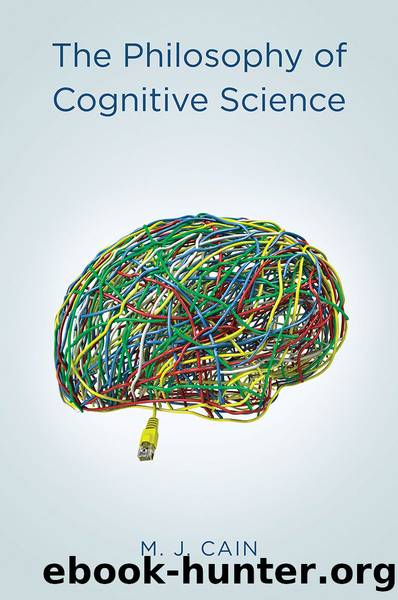The Philosophy of Cognitive Science by Cain Mark J.;

Author:Cain, Mark J.; [Cain, M. J.]
Language: eng
Format: epub
Publisher: Polity Press
Published: 2015-04-20T08:25:03+00:00
5 The theory theory of concepts
The theory theory places explanation at the heart of its account of concepts, and it does this through drawing an explicit comparison between concepts and scientific theories. In short, it says that concepts are theories that are akin to scientific theories.12 To unpack this, it will be helpful to recapitulate some of the key features of science and scientific theories as described in chapter 1.
Here are some prominent features of science. First, most scientists assume that happenings in the natural world are not entirely random and irregular but are governed by laws. Thus, one of the main goals of science is to discover the laws that govern the workings of the natural world. Second, it is a goal of science to explain features of the natural world rather than merely to describe them, and laws are often appealed to in such explanations. Third, science is an empirical discipline in that observation and experiment play a central role in the scientific project. Fourth, in the course of explanation, scientists often postulate theoretical entities. These are things that are not observed but are invoked to explain phenomena that are observable. Prominent examples include genes, microbes, atoms, quarks and photons. Fifth, there is not just one science but many distinct sciences, each of which has its own distinct explanatory goals, theoretical commitments, research methods and technical vocabularies. Examples of distinct sciences are physics, chemistry, biology, meteorology, geology, psychology, and so on.
Given that science has the features described in the previous paragraph, we can give a general account of a scientific theory in the following terms. A scientific theory is a complex structure that purports to explain phenomena in some specific domain of the natural world. It will typically postulate unobservable phenomena that have the power to cause observable events and laws governing the interactions between phenomena (observable and unobservable).
The theory theory of concepts has its origins in developmental psychology, and so its champions are concerned primarily with the nature of children’s concepts and how those concepts develop as an individual grows. Accordingly, children are portrayed as being little scientists who construct theories on the basis of their experience and whose theories change and develop over time in a manner that echoes the history of science. Although experience plays a key role in the development of a child’s theories, advocates of the theory theory usually credit children with a substantial innate endowment with respect to theories. First, children innately carve up the world into distinct domains, including the biological, the psychological and the physical, and construct distinct theories to deal with each of these domains. Second, the cognitive mechanisms that children employ to construct theories are innate and, according to some, are the very mechanisms that adult scientists employ.13 Third, children have innate starting theories, though those theories are often replaced in the course of development (Carey, 2009).
Some advocates of the theory theory have attributed a further innate dimension to the theoretical perspective of children.14 For they have claimed that children are essentialists about many of the categories for which they have concepts.
Download
This site does not store any files on its server. We only index and link to content provided by other sites. Please contact the content providers to delete copyright contents if any and email us, we'll remove relevant links or contents immediately.
Enlightenment Now: The Case for Reason, Science, Humanism, and Progress by Steven Pinker(6405)
The Immortal Life of Henrietta Lacks by Rebecca Skloot(3826)
A Journey Through Charms and Defence Against the Dark Arts (Harry Potter: A Journey Through…) by Pottermore Publishing(3602)
Elon Musk by Ashlee Vance(3455)
Origin Story: A Big History of Everything by David Christian(3139)
A Journey Through Divination and Astronomy by Publishing Pottermore(3068)
COSMOS by Carl Sagan(2950)
Enlightenment Now by Steven Pinker(2917)
Alchemy and Alchemists by C. J. S. Thompson(2911)
Inferior by Angela Saini(2831)
Bad Pharma by Ben Goldacre(2730)
Shadow of Night by Deborah Harkness(2718)
A Mind For Numbers: How to Excel at Math and Science (Even If You Flunked Algebra) by Barbara Oakley(2691)
Origin Story by David Christian(2683)
Signature in the Cell: DNA and the Evidence for Intelligent Design by Stephen C. Meyer(2501)
A Brief History of Time by Stephen Hawking(2473)
A Journey Through Potions and Herbology (A Journey Through…) by Pottermore Publishing(2434)
The Elements by Theodore Gray(2432)
The End of Faith by Sam Harris(2290)
